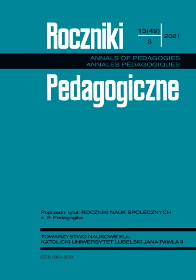Tożsamość osobista i jej związek z akceptacją siebie jako osoby głuchej – badania nad dorosłymi użytkownikami implantów ślimakowych z głuchotą prelingwalną
Person Identity and Its Relation with the Self-Acceptance as a Deaf Person – Studies on the Prelingually Deaf Adults Using Cochlear Implants
Author(s): Joanna KoboskoSubject(s): Social Sciences, Education, Pedagogy
Published by: Towarzystwo Naukowe KUL & Katolicki Uniwersytet Lubelski Jana Pawła II
Keywords: deaf person identity; self-acceptance as a deaf person; prelingual deafness; cochlear implant
Summary/Abstract: Person identity, also in the aspect of experiencing the self as a deaf person, plays a vital role in the mental health of deaf and hard-of-hearing people. The aim of the present study is to examine its relation with the self-acceptance as a deaf person. The study involved 84 people with prelingual deafness who underwent cochlear implantation with high competencies in the Polish phonic language aged between 18 and 45. The I–Others questionnaire was used to describe a person identity. The self-acceptance was measured using the VAS-type scale. Person identity of the prelingually deaf CI users is differentiated from others by characteristics perceived by them to be the strongest, such as “sensitive” or “good”, or the weakest, such as “hearing” or “stupid”. It turned out that alongside lower self-acceptance as a deaf person we can expect the perception of self as more “shy”, “lonely”, or “weak” in interpersonal relations, as well as possessing higher intensity of negative traits overall. These attributes are important characteristics of person identity as a deaf person.
Journal: Roczniki Pedagogiczne
- Issue Year: 13/2021
- Issue No: 3
- Page Range: 117-133
- Page Count: 17
- Language: Polish

